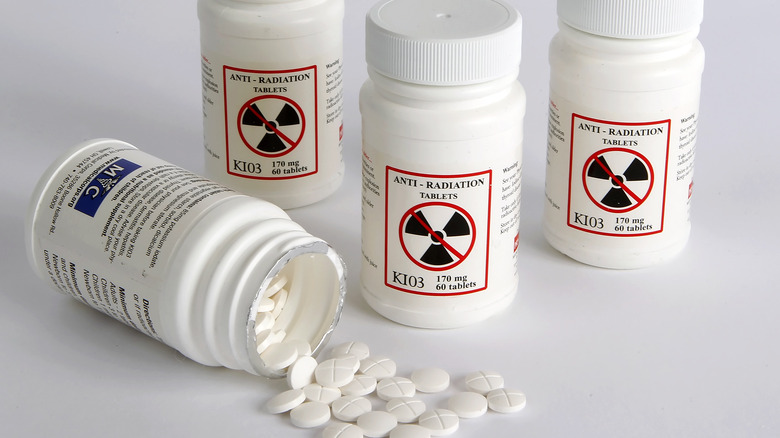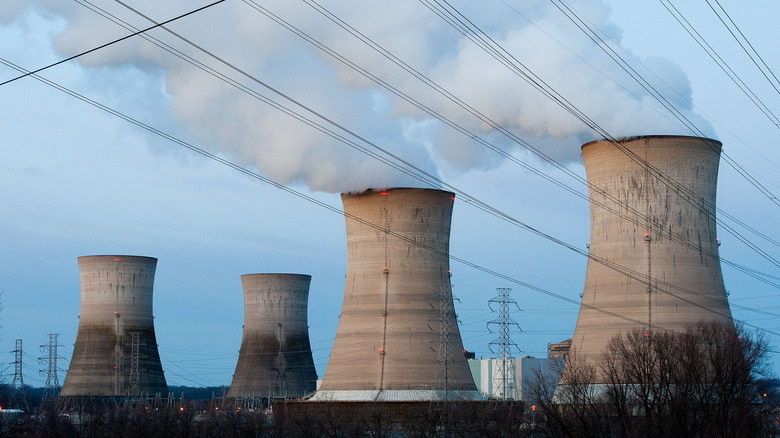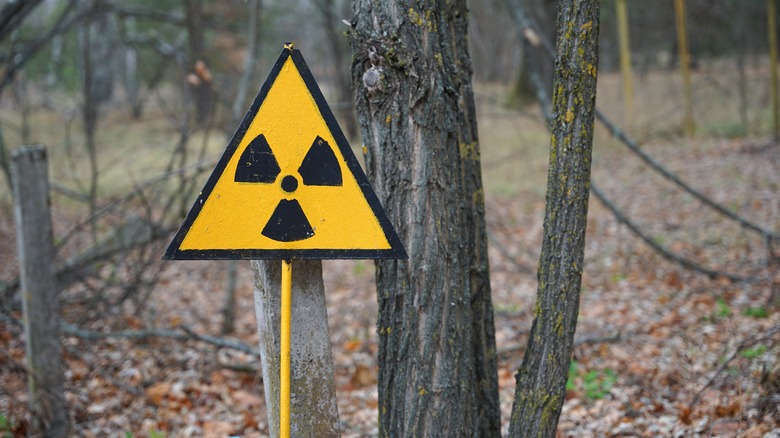Why The Threat Of Nuclear War Has Created A Demand For Potassium Iodide
It's often said that everything old becomes new again. Take vinyl records or big, chunky sneakers, for instance. Unfortunately for everyone on the planet, the threat of nuclear war, which was commonplace through the Cold War, falls under the category of "everything," and seems to be making a comeback.
According to Newsweek, Russia's invasion of Ukraine in 2022, and the subsequent announcement that the country was putting its nuclear arsenal on high alert, have escalated tensions and fear of nuclear annihilation to a level they haven't been at since the fall of the Soviet Union. Those fears also mean that people are trying to prepare for any possible worst-case scenarios and gathering the supplies they'll need to survive. One of these is potassium iodide, which if taken in the proper dosage can prevent some radioactive material from being absorbed into one's thyroid. According to CNN, the potential use of potassium iodide pills has caused a sharp increase in demand.
How do potassium iodide pills work?
Potassium iodide, also known as KI, is a useful substance in preventing the harmful effects of radiation, but only as it relates to the thyroid. Health Physics Society, an organization that specializes in radiation safety, notes that potassium iodide pills are only useful in blocking the absorption of radioiodide, and is not, as some believe, a "magic bullet" against all forms of radiation poisoning.
If taken just before or after exposure to radioiodide exposure, a proper dose of potassium iodide — 130 milligrams for an adult — will cause the thyroid gland to absorb enough of the non-radioactive potassium iodide that it won't be able to absorb any of the radioactive radioiodide.
"If the thyroid absorbs all the iodine that it needs from the non-radioactive KI, then the radioactive iodine will not be absorbed and will be eliminated from the body mostly by way of the urine," Health Physics Society explains. "Reducing the amount of radioiodine absorbed in the thyroid will reduce the dose received by the thyroid, thereby reducing the risks of thyroid cancer."
The first instance of iodide pills as thyroid blocker
The first instance of potassium iodide being used as thyroid protection against radiation came in 1979 in the wake of the Three Mile Island accident. According to the United States Nuclear Regulatory Commission, on March 28, 1979, one of the reactors at the Three Mile Island nuclear facility located near Middletown, Pennsylvania — just down the Susquehanna River from the Harrisburg, the state capital — suffered a partial meltdown. Small amounts of radiation were released in the incident, but they "had no detectable health effects on plant workers or the public."
According to the National Library of Medicine, this led to the idea of using potassium iodide to protect against radioiodide absorption by the thyroid, but the problem was there weren't enough commercially produced potassium iodide pills to protect the large number of people who would be affected by any future incidents. The Food and Drug Administration decided to oversee the manufacturing and stockpiling of enough potassium iodide to protect up to 1 million people in the event of a large-scale nuclear incident.
Potassium iodide within other nuclear disasters
A few years after the Three Mile Island incident, potassium iodide was put into use following the far more damaging Chernobyl disaster. According to Newsweek, the 1986 incident involved a massive release of radioactive material after an explosion at the nuclear power plant.
This included radioactive iodine isotopes which caused an increase in thyroid cancer cases, especially in children, whose thyroid glands have a greater tendency to absorb the radioactive isotopes. Even after more than 30 years, there are still a higher than normal number of thyroid cancer cases in the area.
According to the National Library of Medicine, following the 2011 Fukushima Daiichi accident, in which the Japanese plant's three reactors all had meltdowns and released large amounts of radioactive materials — the result of damage sustained by a massive earthquake and tsunami — measures for maintaining help were discussed, one of which was distributing potassium iodide pills to the public.



